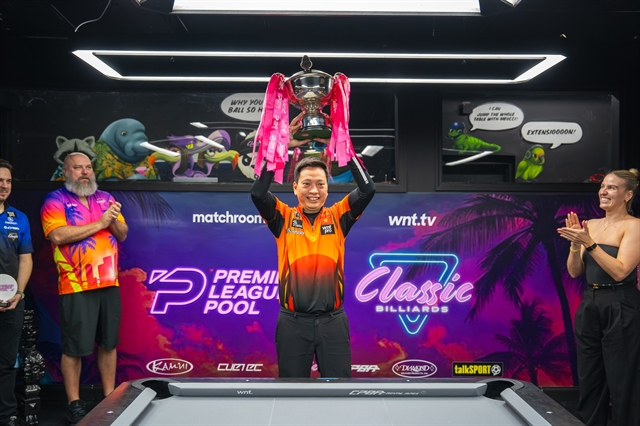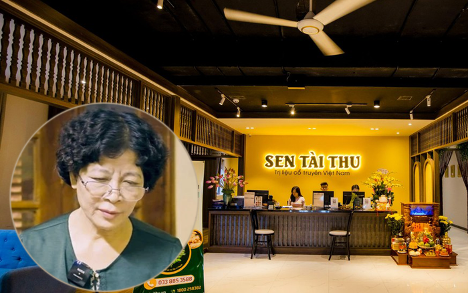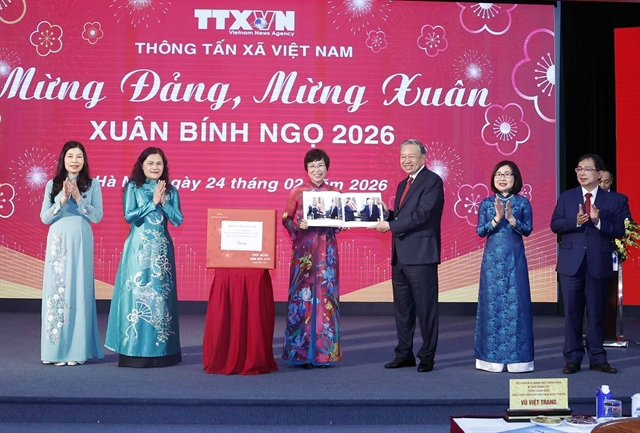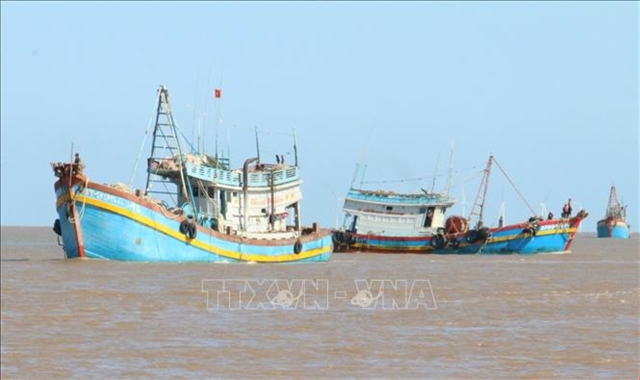 Society
Society
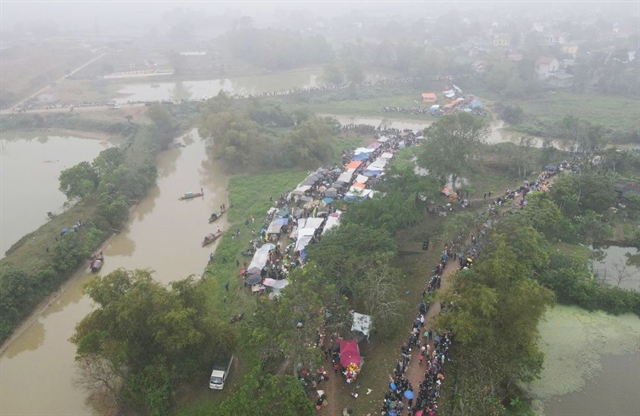
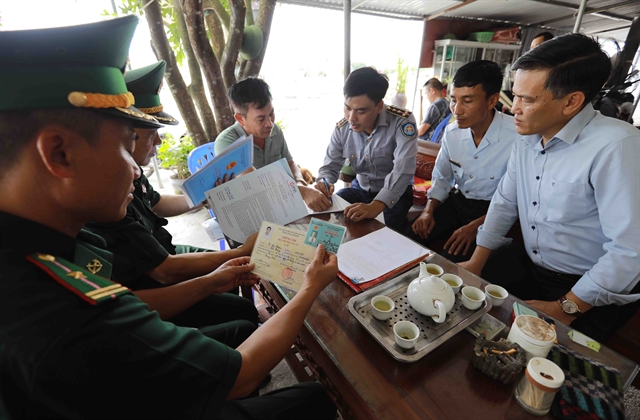 |
| Vessel owners in Hải Phòng City are educated about IUU regulations before leaving port for fishing. — VNA/VNS Photo Vũ Hữu Sinh |
HÀ NỘI — To have the “yellow card” that the European Commission (EC) has imposed on Vietnamese seafood regarding illegal, unreported, and unregulated (IUU) fishing lifted has been considered an urgent task of the fishery sector.
This is not only a matter of strictly implementing the 2017 Fisheries Law but also protecting coastal security and the safety of the marine ecosystem. Over the past seven years since being imposed the warning, Việt Nam has been working hard to step by step fulfil the European Union's standards and hopefully have the "yellow card" removed in the upcoming examination.
Recently, 28 coastal provinces and centrally-run cities of Việt Nam have strictly complied with the Government’s directions on thoroughly handling violations on IUU fishing prevention and control regulations, and geared up for the last examination.
"Combating IUU fishing is a condition we must meet so as for Vietnamese seafood products to have a better market share in Europe in the future,” said Prime Minister Phạm Minh Chính.
Statistics from the Ministry of Agriculture and Rural Development showed that currently, there are three difficulties and problems that Việt Nam must deal with to implement the EC’s recommendations.
The first one is fishing vessels’ violations of foreign waters, the second is the situation of vessels’ deactivation of the Vessel Monitoring System (VMS), and the last one is that Việt Nam still has boats that are not registered and checked and, has no exploitation licences.
“These are the three major causes behind fishermen’s legal violations. The issue of vessels’ turning off the VMS is among the EC’s concerns as it asserts that there is no reason that Việt Nam cannot deal with this problem,” said Minister of Agriculture and Rural Development Lê Minh Hoan.
As a coastal locality, the southern province of Bà Rịa-Vũng Tàu and its Vũng Tàu City in particular have rolled out various measures to cope with the existing problems following the recommendations given by the EC delegation in 2023.
Trần Thị Thu Hường, Head of the Division for Economic Affairs of the Vũng Tàu People’s Committee, said that currently, 98.4 per cent of local fishing vessels with a length of 15m and above had installed VMSs, and the remainders were not operating.
In the south-central province of Ninh Thuận, Vice Chairman of the provincial People’s Committee Trịnh Minh Hoàng said that the locality had issued a plan to implement urgent tasks and solutions to combat IUU fishing, which comprises five major tasks and three groups of solutions to ensure that all fishing activities are legal.
Coastal localities in the south have also held many meetings with fishermen to enhance their awareness of IUU fishing prevention and control with the hope of completing all criteria for the upcoming decisive examination.
In Bà Rịa-Vũng Tàu, the border guard force has also organised meetings with more than 200 offshore fishermen to encourage them to sign commitments with the administration and leaders of the provincial fisheries sector to strictly implement IUU prevention and control regulations in 2024.
“The border guard force has inspected and closely controlled the movement of fishing vessels at ports. Vessels that fail to show enough documents will not be allowed to go to the sea for fishing,” said Sen. Lieut. Col. Nguyễn Văn Khánh, Deputy Chief of Staff of the Border Guard Command of Bà Rịa-Vũng Tàu Province.
Meanwhile, in the south-central province of Ninh Thuận, offshore fishermen have actively gathered together to share knowledge on IUU fishing prevention and control regulations, and formed groups of offshore fishing vessels to support each other in unexpected circumstances at sea.
Huỳnh Quốc Việt, Chairman of the People’s Committee of southern Cà Mau Province, said that over the years, the locality had stepped up the application of information technology and digital transformation achievements into verifying and certifying the origins of exploited seafood.
Thanks to these efforts, Cà Mau had controlled 100 per cent of fishing vessels going in and out of ports through 10 existing border control stations in the province, while establishing nine additional inspection and mobile control posts at seaports without border control stations.
At the same time, violations had been detected and handled with the joint efforts of the whole political system, striving for a sustainable fishery sector.
Government’s high determination to complete legal framework for IUU fishing combat
As part of the efforts to prepare for the final examination, the Government has issued Decree No. 37/2024/NĐ-CP on adjustments and supplements to a number of articles of Decree No. 26/2019/NĐ-CP detailing a number of regulations in the Fisheries Law and Decree No. 38/2021/NĐ-CP on administrative punishments in the field of fisheries, which replaced Decree No. 42/2019/NĐ-CP on regulations on administrative sanctions in the field of fisheries.
This demonstrated the Government’s high determination to complete the legal framework regarding IUU fishing prevention and control following the EC’s recommendations.
According to Dương Văn Cường, Deputy Director of the Vietnam Fisheries Surveillance, Decree No. 37/2024/NĐ-CP and Decree No. 38/2021/NĐ-CP have amended and supplemented many legal regulations to ensure that they are more suitable and meet the recommendations and requirements of the EC in the fourth inspection.
For Decree 37/2024/NĐ-CP, the most important point is the addition of Article 70a after Article 70. The Government has stipulated contents to manage exploited seafood imported into Việt Nam and provided for processing factories and then exported to markets, including the European market.
Việt Nam is determined to control aquatic raw materials imported into Việt Nam to ensure that all products entering Việt Nam do not violate IUU fishing regulations. Any product entering processing factories and provided for other markets must be certified that its origin is transparent and it is not an IUU-violating product.
In Decree 38/2021/NĐ-CP, the Government adjusted fines and increased additional sanctions against serious violations of IUU fishing regulations. The fines are higher than those in Decree 42/2019/NĐ-CP.
Decree 37/2024/NĐ-CP took effect on May 19, and Decree 38/2021/NĐ-CP came into force on May 20.
“Currently, the border guard force is coordinating closely with the coast guard and naval forces as well as the local fishery control forces and fishery sectors to increase the frequency, duration, and forces for registration, inspection and control and ensure that 100 per cent of fishing vessels operating at sea are strictly inspected, controlled and managed," said Vũ Văn Hưng, Deputy Chief of Staff of the Border Guard Command under the Ministry of National Defence.
On April 10, 2024, the Party Central Committee’s Secretariat issued Directive No. 32-CT/TW on strengthening the Party’s leadership over IUU fishing prevention and control and promoting the sustainable development of the fisheries sector. The document mobilises the engagement of the whole political system in the process of leading and directing the IUU fishing prevention and control. As a result, the IUU fishing combat has received thorough direction from the Party and State. The current problem is how Việt Nam can show the inspection team from the EC that the country’s efforts do not stop at the promulgated institutions but the actions of localities in reality. — VNS


